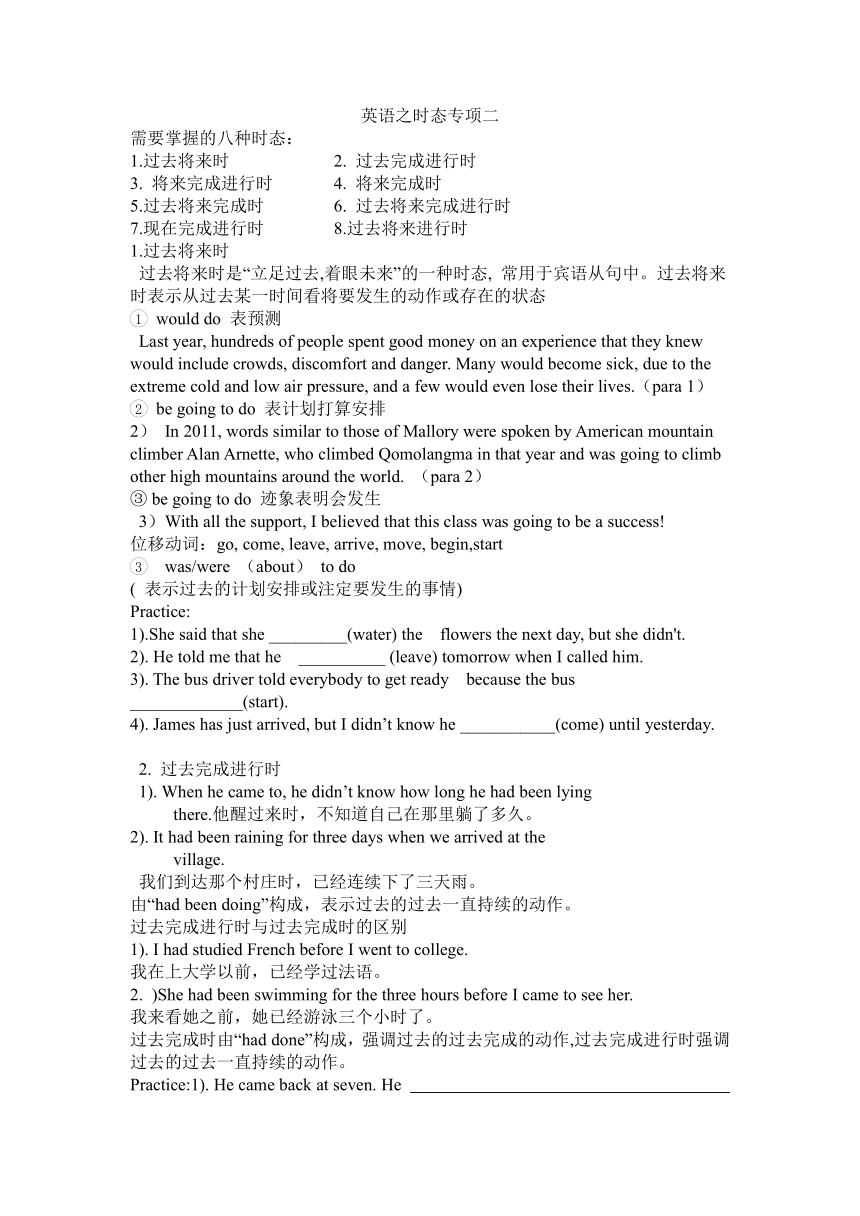
英语之时态专项二 需要掌握的八种时态: 1.过去将来时 2. 过去完成进行时 3. 将来完成进行时 4. 将来完成时 5.过去将来完成时 6. 过去将来完成进行时 7.现在完成进行时 8.过去将来进行时 1.过去将来时 过去将来时是“立足过去,着眼未来”的一种时态, 常用于宾语从句中。过去将来时表示从过去某一时间看将要发生的动作或存在的状态 would do 表预测 Last year, hundreds of people spent good money on an experience that they knew would include crowds, discomfort and danger. Many would become sick, due to the extreme cold and low air pressure, and a few would even lose their lives.(para 1) be going to do 表计划打算安排 2) In 2011, words similar to those of Mallory were spoken by American mountain climber Alan Arnette, who climbed Qomolangma in that year and was going to climb other high mountains around the world. (para 2) ③ be going to do 迹象表明会发生 3)With all the support, I believed that this class was going to be a success! 位移动词:go, come, leave, arrive, move, begin,start was/were (about) to do ( 表示过去的计划安排或注定要发生的事情) Practice: 1).She said that she _____(water) the flowers the next day, but she didn't. 2). He told me that he _____ (leave) tomorrow when I called him. 3). The bus driver told everybody to get ready because the bus _____(start). 4). James has just arrived, but I didn’t know he _____(come) until yesterday. 2. 过去完成进行时 1). When he came to, he didn’t know how long he had been lying there.他醒过来时,不知道自己在那里躺了多久。 2). It had been raining for three days when we arrived at the village. 我们到达那个村庄时,已经连续下了三天雨。 由“had been doing”构成,表示过去的过去一直持续的动作。 过去完成进行时与过去完成时的区别 1). I had studied French before I went to college. 我在上大学以前,已经学过法语。 )She had been swimming for the three hours before I came to see her. 我来看她之前,她已经游泳三个小时了。 过去完成时由“had done”构成,强调过去的过去完成的动作,过去完成进行时强调过去的过去一直持续的动作。 Practice:1). He came back at seven. He (wait) for her for two hours.他七点回来的。他已经等她两个小时了。 )He (just get) home when it began to rain. 他刚到家,就开始下雨了。 3). I (surf) online for two hours by the time she came to see me. 到她来看我的时候,我已经上网两个小时了。 小结 过去完成进行时由“ ”构成,表示过去的过去“ ”。 过去完成时由“ ”构成,表示过去的过去 “ ”。 将来完成进行时 定义:表示动作从某一时间开始一直延续到将来某一时间。是否继续下去,要根据上下文而定。 例如: 到今年年底,我将在这个工厂工作10年了。 (“工作”这个动作从现在开始一直延续到今年年底) 将来完成时的构成 shall / will + have been doing 1)shall + have done 只用于第一人称(I, we) 2)will + have done 用于所有人称 将来完成进行时的肯定句 主语 + shall / will + have been doing 将来完成进行时的否定句 主语 + shall / will + not + have been doing 将来完成进行时的一般疑问句 shall / will + 主语 + have been doing 将来完成进行时的用法 1). 表示动作从某一时间开始一直延续到现在 2). 表示一个已经进行的动作到某一将来时刻仍在继续进行 3).在下面这个句子中,will是 ... ...
~~ 您好,已阅读到文档的结尾了 ~~

